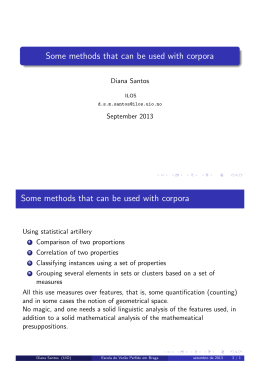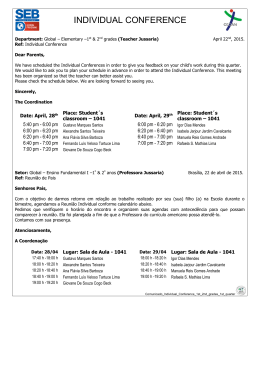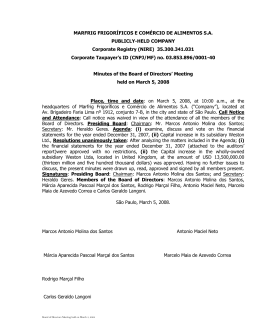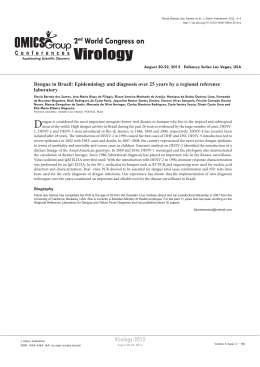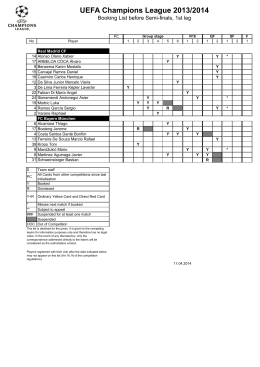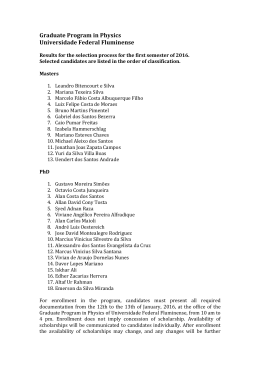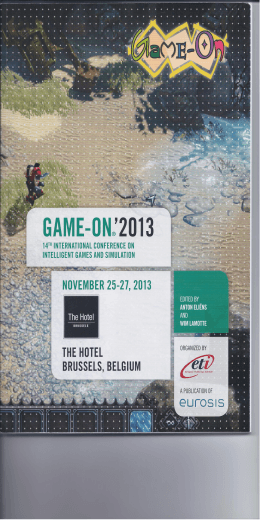“Own” work with emotions Diana Santos ILOS [email protected] June 2015, day 5 Why am I here? I am responsible for a large infrastructure for Portuguese corpus processing, AC/DC and Gramateca, both under the largest venue of Linguateca, where, in addition to other semantic fields, we decided to annotate emotions Also the contrastive (cultural and grammatical) issues are extermely important in my teaching and research activity, and I work in several parallel corpora Note: Most if not all the work here is done in collaboration with my colleagues in Linguateca. Diana Santos (UiO) Emotions - 5 June 2015 2 / 13 Annotate with emotions? What does this mean? Note that we are talking here of 1.3 billion words of several genres. decide on which families (group of emotions) decide on which members in each family decide what to do with ambiguous words, and with vague words Diana Santos (UiO) Emotions - 5 June 2015 3 / 13 We used roughly Belinda’s classes We used Belinda’s classes, but also added some others, due to disagreement or due to specific interest in that area. Then we used several thesauri for getting members of each family, as well as (as an annotator marking those which were obviously ambiguous. Then we automatically annotated all instances of those lexemes with the label of either emomax or emomin. See Mota & Santos (2015) for details. And (for some specific cases, in some corpora) created some rules for disambiguating emotion. Diana Santos (UiO) Emotions - 5 June 2015 4 / 13 List of emotion families 19 cases alívio amor desejo esperança furia infeliz insatisfeito orgulho saudade vergonha relief love desire hope anger unhappy insatisfaction pride missing, nostalgy shame Diana Santos (UiO) admirar coragem desespero feliz grato humildade medo satisfeito surpresa admiration courage despair happy grateful humbleness fear content surprise Emotions - 5 June 2015 5 / 13 Then we were able to study some cases Fear and courage: Maia & Santos (2013) at ICAME Surprise vs. admiration: Santos & Mota (2015) Emotion per genre and passives of emotion verbs in Santos (2015) Correlation between polarity annotated in (book) reviews and emotion words, Santos et. al. (2015) Diana Santos (UiO) Emotions - 5 June 2015 6 / 13 New ideas Emotion network: which emotion families co-occur in text? (In vercial) Diana Santos (UiO) Emotions - 5 June 2015 7 / 13 Emotion infrastructure Simply measuring the co-occurrence of the families may mask issues of frequency and others. The advantage of having other annotations in the corpora is that one can also crossreference with tense crossreference with passive crossreference with person crossreference with subject and target crossreference with genre crossreference with body and colour Diana Santos (UiO) Emotions - 5 June 2015 8 / 13 Emotion infrastructure: examples Which cases associated with body are labeled “emotion” or “opinion”? corpo:sentimento meu coração... de cortar o coração, ódio no coração, trazia nos olhos, três pedras na mão, cara fechada, sangue ferve, arejar a cabeça corpo:opiniao cara de..., desmiolada, bater palmas corpo:atitude rojar-se aos pés, encolher os ombros Which cases have both body and emotion in a sentence? Examples next slide Diana Santos (UiO) Emotions - 5 June 2015 9 / 13 Emotion infrastructure: examples og body and emotion sorriso no rosto felicidade estampada nos rostos cabelos em fúria coragem de dar as mãos agitada, olhos arregalados rancor irradiava-lhe dos olhos de pé, terrível, pálido da raiva sentir a adrenalina no sangue não querem mais derramamentos de sangue a melancolia da separação dera-lhe cabelos brancos Agressivamente um dos vendedores resmungou entre dentes mal seguro nas pernas, que vergavam sob o peso da ira Diana Santos (UiO) smile in the face happiness written in the face hair in anger courage to give hands frenetic, with wide-opened eyes contempt emanated from his eyes standing, awful, pale of hate feel adrenalin in the blood do not want no more blood sheddings sadness of separation turned his hair white aggressively mumbling with gritted teeth hardly on his legs, falling with the hate weight Emotions - 5 June 2015 10 / 13 Emotion infrastructure: examples of colour and emotion COLOUR de EMOTION cor de paixão/alegria/cólera cor de esperança colorido de felicidade negra/negrume/negrura de tristura, tristeza, agonias empalideceu de cólera, raiva, espanto, furor, assombro, vergonha pálido de terror, raiva, medo, cólera, susto, desconsolação, furor, pavor, espanto, humilhação vermelho/rubro/roxo de cólera, ira, raiva, zanga, ódio, irritação branco de susto, medo, pânico branco de cólera concentrada Diana Santos (UiO) colour of passion, joy, fury colour of hope coloured of happiness black(ness) of sadness get pale of anger, fury, surprise, shame... pale of anger, fury, surprise, shame, fear, terror, humiliation... red/purple of anger, hate, irritation white of fear white of concentrated anger Emotions - 5 June 2015 11 / 13 Emotion infrastructure: examples of colour and emotion escarlate/vermelha/roxa de vergonha, pudor, pejo, modéstia, embaraço vermelha/escarlate/rubra/fulvo de prazer, satisfação, gozo, amor, paixão, alegria roxo de decepção escarlate/rubro de orgulho/glória verde de horror, susto, medo verde de inveja, fúria, ódio, raiva, vergonha esverdinhada/esverdeado de cólera, raiva amarelo de raiva, medo, terror, pavor negro de raiva olhos negros de cólera beiços/lábios brancos/alvacentos de raiva/agonias/terror Diana Santos (UiO) red/purple/violet of shame, modesty, embarrassment red/purple of pleasure, satisfaction, joy, love... violet of disappointment scarlet of pride/glory green of horror, fear green of envy, anger, hate, shame greenish of anger yellow of rage, fear black of rage eyes black from anger lips white from anger/terror Emotions - 5 June 2015 12 / 13 Concluding remarks infrastructure: what does this mean? lots of things to investigate: endless exploratory studies does it pay? Or precisely the emotions/feelings are lacking in (written) corpora? how consensual are the emotions chosen? (in the sense of alowing for different applications) how to evaluate independently the value of these large annotation projects? How to define a user-visible task (to be evaluated) instead of user-transparent ones, in terms of Gaizauskas (1998)? Diana Santos (UiO) Emotions - 5 June 2015 13 / 13
Download

